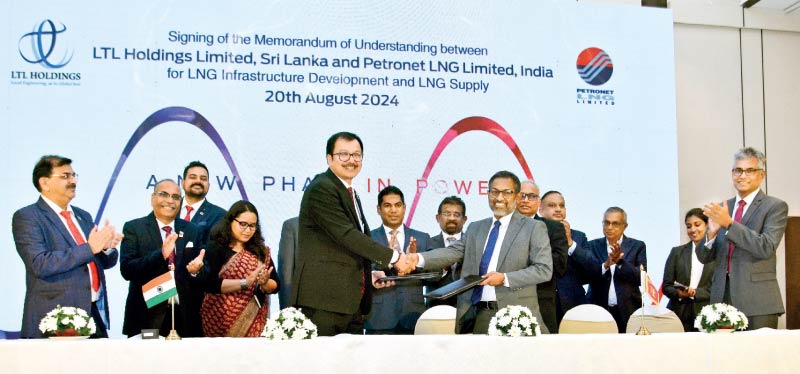Wednesday Feb 25, 2026
Wednesday Feb 25, 2026
Wednesday, 21 August 2024 04:10 - - {{hitsCtrl.values.hits}}

Petronet LNG CEO-MD Shri Akshay Kumar Singh (left) and LTL Holdings CEO Nuhuman Marikkar exchange MoU between two companies. Power and Energy Minister Kanchana Wijesekera and other invitees look on - Pic by Upul Abayasekara
A Memorandum of Understanding (MOU) was signed yesterday between LTL Holdings Ltd., Sri Lanka, and Petronet LNG Ltd., India, to develop infrastructure for the storage, regasification and supply of Liquefied Natural Gas (LNG) to the ‘Sobadhanavi’ Combined Cycle Power Plant in Kerawalapitiya.
The agreement marks a significant step in modernising the country’s energy sector and reducing reliance on fuel sources.
The MoU was signed by LTL Holdings CEO Nuhuman Marikkar and Petronet LNG CEO and Managing Director Akshay Kumar Singh, with Power and Energy Minister Kanchana Wijesekera highlighting the initiative as a crucial component of President Ranil Wickremesinghe’s broader energy strategy.
“This initiative is a key part of the Government’s efforts to ensure a continuous, high-quality electricity supply at minimal cost, benefiting electricity users across Sri Lanka,” Minister Wijesekera stated.
He emphasised that the partnership represents progress toward a more sustainable and cost-effective energy future for the country.
The Sobadhanavi plant, developed and operated by Lakdhanavi Ltd., the power development arm of LTL Holdings, will significantly enhance Sri Lanka’s energy generation capabilities.
The first phase of the plant is set to be commissioned in August 2024, with the second phase scheduled for early 2025
As an interim solution, LNG will be imported from Petronet’s terminal in Kochi, India, using cryogenic ISO containers. These will be transported from Colombo Port to the Kerawalapitiya storage and regasification terminal, which will be built adjacent to the Sobadhanavi plant.
Minister Wijesekera also addressed the challenges faced by the energy sector in recent years, including difficult policy decisions such as increasing electricity tariffs.
He noted that these measures have enabled the Ceylon Electricity Board (CEB) to become a debt-free, financially stable institution, which has in turn attracted new investments in the energy sector.
“By signing these agreements, we aim to reduce electricity costs by 40% to 50%. We plan to pass these savings on to electricity users, thereby reducing energy costs in Sri Lanka. However, it’s important to recognise that this is a challenging task,” he added.
The Minister also said that the Government aims to begin power generation at the Yugadhanavi and Sobadhanavi power plants in early 2026, with the Sobadhanavi plant expected to be operational by 28 August.
“This timeline is due to the need to run the plants on diesel and fuel oil during the first year before transitioning to liquefied natural gas. As a result of the agreements signed, electricity users in Sri Lanka will see significant benefits in the future, not only financially but also in terms of reducing environmental impacts,” he explained.
Wijesekera said the Government has established a policy to phase out the use of diesel, crude oil and naphtha, with a goal of meeting 70% of the country’s electricity needs through renewable energy and the remaining 30% through LNG. “We are working to build the necessary infrastructure to integrate renewable energy into the electricity grid,” he said.
He recalled difficult decisions made over the past two years amid the economic crisis. “We were faced with the choice of either allowing 16-hour power cuts or ensuring a continuous electricity supply while managing costs. Ultimately, we prioritised consistent power delivery, even if it meant making tough adjustments to pricing.
As we all know from experience, even a few hours of power cuts can cause significant economic damage and disrupt people’s lives,” he added.
The Minister said in 2022, the CEB had accumulated a loss of Rs. 300 billion, which included loans from two State banks and payments owed to suppliers. By implementing a cost-reflective tariff system, the Government has been able to repay a large portion of these bank loans and all outstanding payments to power plant suppliers have now been settled.
Additionally, he said that they were able to pay off all debts to the CPC due to the difficult but necessary decisions we made.
“We are now in a position to reach such agreements and encourage both local and foreign investments. Through these efforts, we aim to provide electricity to the people of this country at the lowest possible cost while ensuring a continuous and high-quality supply. My sincere thanks go to everyone who contributed to this achievement,” Wijesekera said.
Deputy High Commissioner of India to Sri Lanka Dr. Satyanjal Pandey stated that ensuring a reliable, cleaner and sustainable energy supply is crucial for driving growth and enhancing the quality of life for all citizens.
“Our joint efforts focus on boosting energy security in Sri Lanka and reducing energy costs, which serve as key drivers of economic development,” he added.
Dr. Pandey said connecting Sri Lanka to emerging regional and global grids, with India as a major transit point, can attract investments to unlock Sri Lanka’s vast green energy potential, generate additional revenue and position the country as a major energy exporter.
“Our current initiatives include the power grid connectivity, infrastructure connections, and a multi-product pipeline, for which discussions are advanced and ongoing. We are also investing in renewable energy projects, such as the solar power project in Sampoor. Both Governments are working closely to swiftly turn these shared aspirations into reality. The signing of the MoU underscores our continued commitment to building on the strong foundation of our bilateral relationship by collaborating in areas essential to our energy needs and the future prosperity of our people,” the Deputy High Commissioner said.
The event was attended by Power and Energy Ministry Secretary Dr. Sulaksha Jayawardena, LTL Holdings Chairman U.D. Jayawardena, CEB Chairman Nalinda Ilangakoon, CPC Chairman Saliya Wickramasuriya along with other ministry officials, Government representatives, investors, board members of the two respective companies, and other distinguished guests.